Inpatient Diabetes Education Consultation: Needs and Impact Report
VerifiedAdded on 2021/04/19
|21
|6081
|63
Report
AI Summary
This report focuses on the critical need for inpatient diabetes education and consultation within healthcare settings, particularly in the US, where diabetes rates are high. It highlights the issue of frequent hospital readmissions and emphasizes the importance of patient education on self-management, healthy diets, and medication administration to reduce healthcare costs and patient dependence on medical channels. The report explores the challenges of implementing inpatient programs, such as knowledge gaps and infrastructure limitations, while discussing the varying impacts of education based on patient backgrounds. It also delves into the benefits of diabetes inpatient programs, addressing educational needs, self-control development, and the significance of such programs in improving patient outcomes. The report includes a literature review, research methodology, discussion of findings, and recommendations for enhancing diabetes education in inpatient settings, aiming to reduce rehospitalization rates and improve overall patient care.
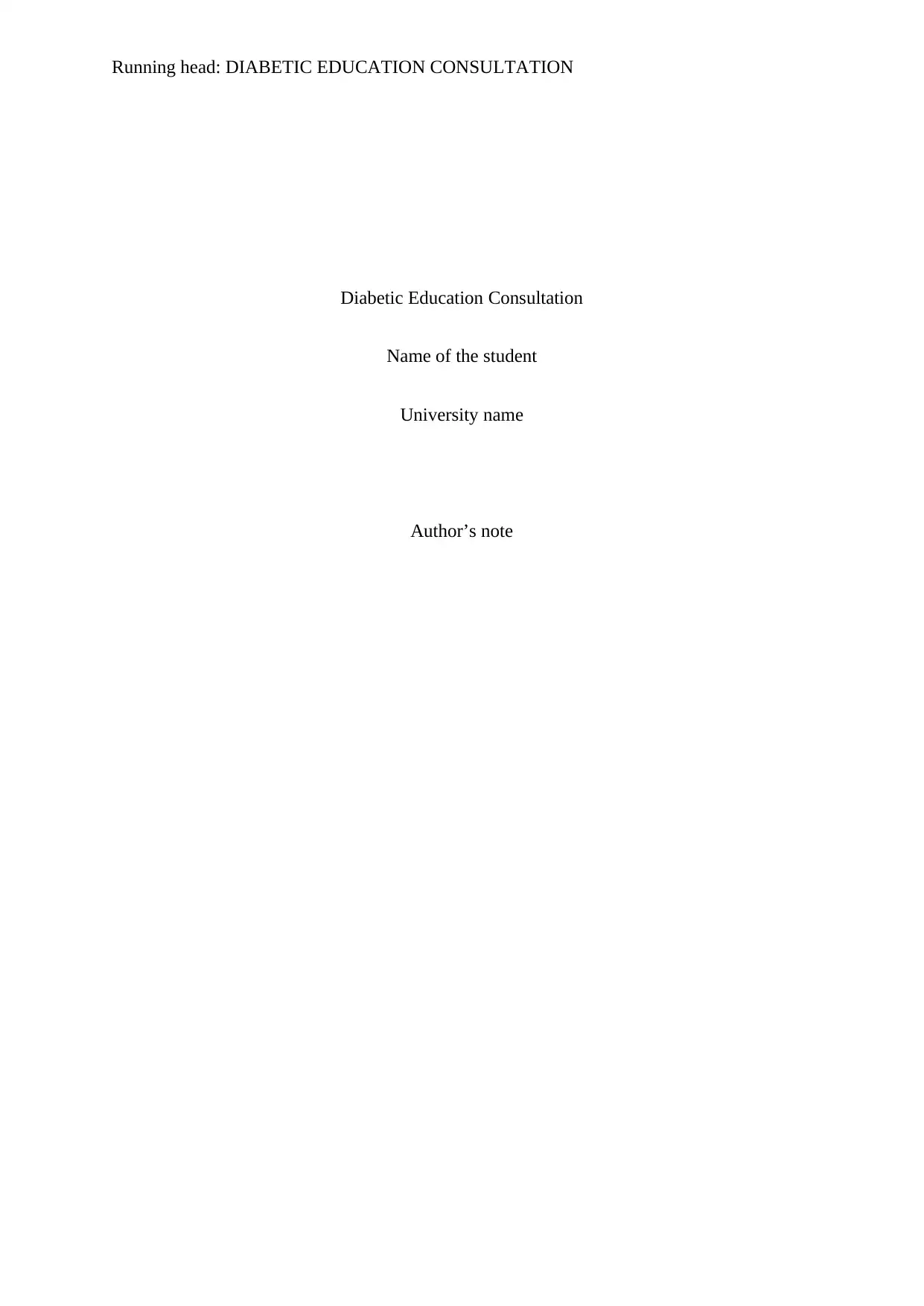
Running head: DIABETIC EDUCATION CONSULTATION
Diabetic Education Consultation
Name of the student
University name
Author’s note
Diabetic Education Consultation
Name of the student
University name
Author’s note
Paraphrase This Document
Need a fresh take? Get an instant paraphrase of this document with our AI Paraphraser
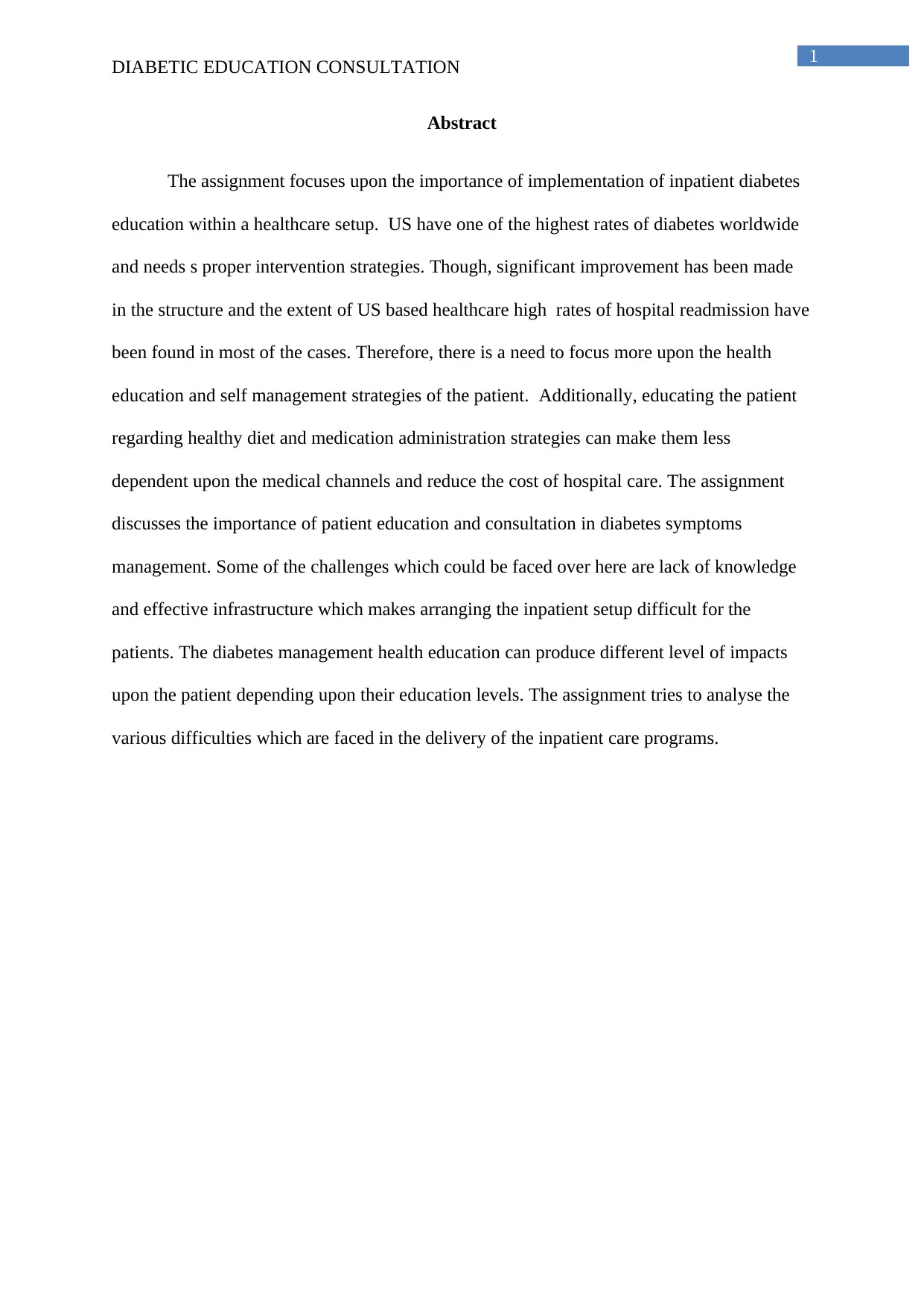
1
DIABETIC EDUCATION CONSULTATION
Abstract
The assignment focuses upon the importance of implementation of inpatient diabetes
education within a healthcare setup. US have one of the highest rates of diabetes worldwide
and needs s proper intervention strategies. Though, significant improvement has been made
in the structure and the extent of US based healthcare high rates of hospital readmission have
been found in most of the cases. Therefore, there is a need to focus more upon the health
education and self management strategies of the patient. Additionally, educating the patient
regarding healthy diet and medication administration strategies can make them less
dependent upon the medical channels and reduce the cost of hospital care. The assignment
discusses the importance of patient education and consultation in diabetes symptoms
management. Some of the challenges which could be faced over here are lack of knowledge
and effective infrastructure which makes arranging the inpatient setup difficult for the
patients. The diabetes management health education can produce different level of impacts
upon the patient depending upon their education levels. The assignment tries to analyse the
various difficulties which are faced in the delivery of the inpatient care programs.
DIABETIC EDUCATION CONSULTATION
Abstract
The assignment focuses upon the importance of implementation of inpatient diabetes
education within a healthcare setup. US have one of the highest rates of diabetes worldwide
and needs s proper intervention strategies. Though, significant improvement has been made
in the structure and the extent of US based healthcare high rates of hospital readmission have
been found in most of the cases. Therefore, there is a need to focus more upon the health
education and self management strategies of the patient. Additionally, educating the patient
regarding healthy diet and medication administration strategies can make them less
dependent upon the medical channels and reduce the cost of hospital care. The assignment
discusses the importance of patient education and consultation in diabetes symptoms
management. Some of the challenges which could be faced over here are lack of knowledge
and effective infrastructure which makes arranging the inpatient setup difficult for the
patients. The diabetes management health education can produce different level of impacts
upon the patient depending upon their education levels. The assignment tries to analyse the
various difficulties which are faced in the delivery of the inpatient care programs.
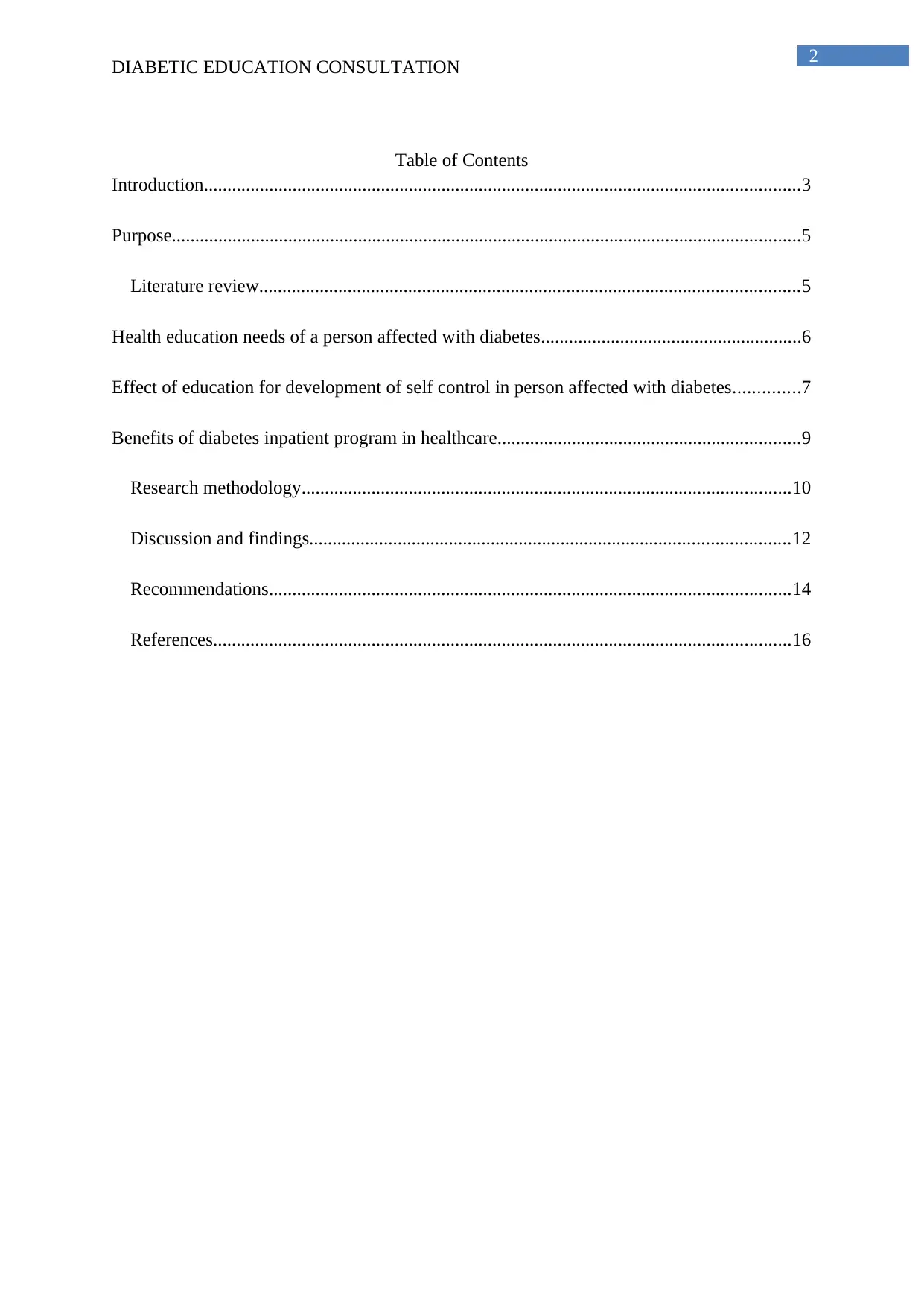
2
DIABETIC EDUCATION CONSULTATION
Table of Contents
Introduction................................................................................................................................3
Purpose.......................................................................................................................................5
Literature review....................................................................................................................5
Health education needs of a person affected with diabetes........................................................6
Effect of education for development of self control in person affected with diabetes..............7
Benefits of diabetes inpatient program in healthcare.................................................................9
Research methodology.........................................................................................................10
Discussion and findings.......................................................................................................12
Recommendations................................................................................................................14
References............................................................................................................................16
DIABETIC EDUCATION CONSULTATION
Table of Contents
Introduction................................................................................................................................3
Purpose.......................................................................................................................................5
Literature review....................................................................................................................5
Health education needs of a person affected with diabetes........................................................6
Effect of education for development of self control in person affected with diabetes..............7
Benefits of diabetes inpatient program in healthcare.................................................................9
Research methodology.........................................................................................................10
Discussion and findings.......................................................................................................12
Recommendations................................................................................................................14
References............................................................................................................................16
⊘ This is a preview!⊘
Do you want full access?
Subscribe today to unlock all pages.

Trusted by 1+ million students worldwide
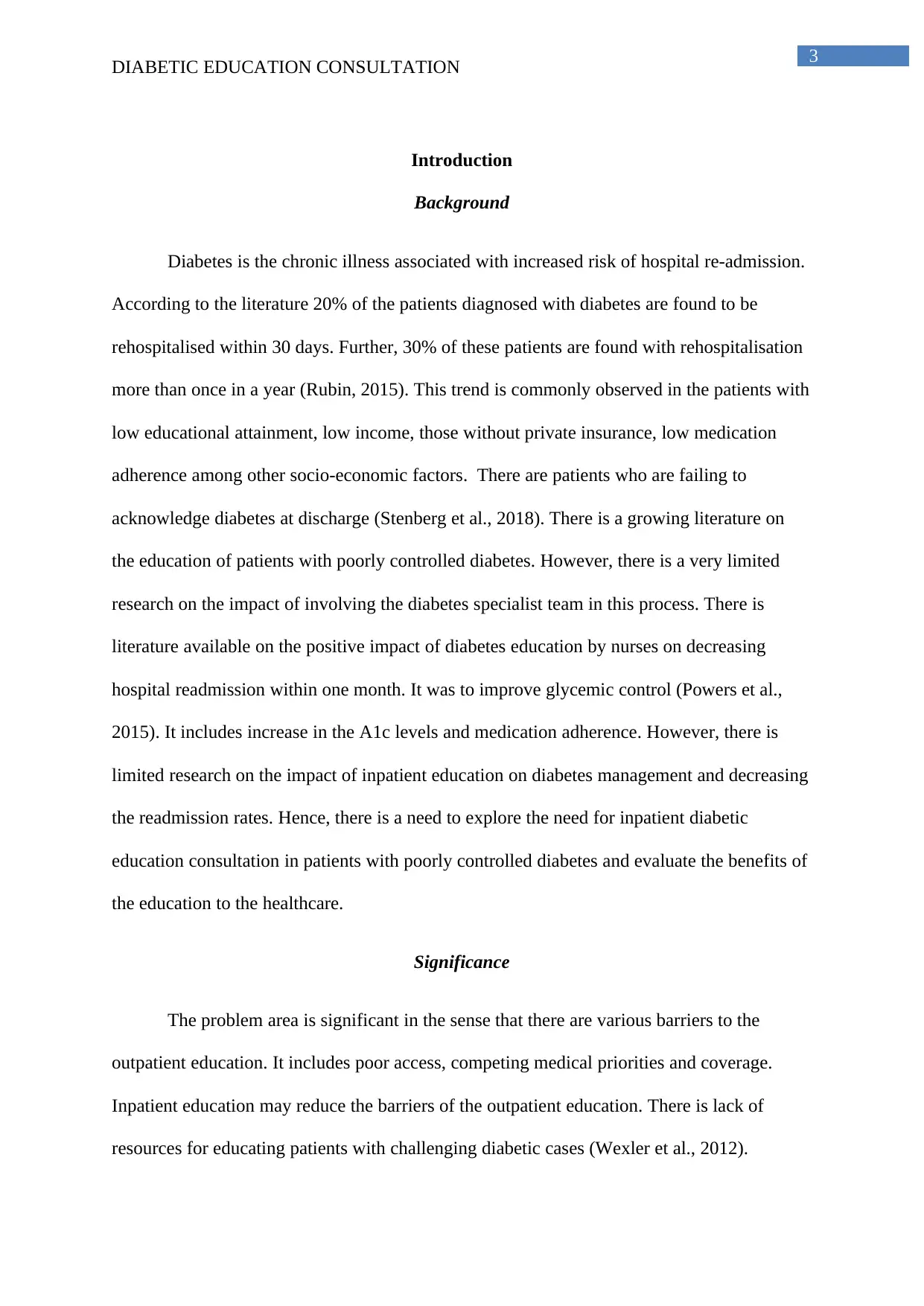
3
DIABETIC EDUCATION CONSULTATION
Introduction
Background
Diabetes is the chronic illness associated with increased risk of hospital re-admission.
According to the literature 20% of the patients diagnosed with diabetes are found to be
rehospitalised within 30 days. Further, 30% of these patients are found with rehospitalisation
more than once in a year (Rubin, 2015). This trend is commonly observed in the patients with
low educational attainment, low income, those without private insurance, low medication
adherence among other socio-economic factors. There are patients who are failing to
acknowledge diabetes at discharge (Stenberg et al., 2018). There is a growing literature on
the education of patients with poorly controlled diabetes. However, there is a very limited
research on the impact of involving the diabetes specialist team in this process. There is
literature available on the positive impact of diabetes education by nurses on decreasing
hospital readmission within one month. It was to improve glycemic control (Powers et al.,
2015). It includes increase in the A1c levels and medication adherence. However, there is
limited research on the impact of inpatient education on diabetes management and decreasing
the readmission rates. Hence, there is a need to explore the need for inpatient diabetic
education consultation in patients with poorly controlled diabetes and evaluate the benefits of
the education to the healthcare.
Significance
The problem area is significant in the sense that there are various barriers to the
outpatient education. It includes poor access, competing medical priorities and coverage.
Inpatient education may reduce the barriers of the outpatient education. There is lack of
resources for educating patients with challenging diabetic cases (Wexler et al., 2012).
DIABETIC EDUCATION CONSULTATION
Introduction
Background
Diabetes is the chronic illness associated with increased risk of hospital re-admission.
According to the literature 20% of the patients diagnosed with diabetes are found to be
rehospitalised within 30 days. Further, 30% of these patients are found with rehospitalisation
more than once in a year (Rubin, 2015). This trend is commonly observed in the patients with
low educational attainment, low income, those without private insurance, low medication
adherence among other socio-economic factors. There are patients who are failing to
acknowledge diabetes at discharge (Stenberg et al., 2018). There is a growing literature on
the education of patients with poorly controlled diabetes. However, there is a very limited
research on the impact of involving the diabetes specialist team in this process. There is
literature available on the positive impact of diabetes education by nurses on decreasing
hospital readmission within one month. It was to improve glycemic control (Powers et al.,
2015). It includes increase in the A1c levels and medication adherence. However, there is
limited research on the impact of inpatient education on diabetes management and decreasing
the readmission rates. Hence, there is a need to explore the need for inpatient diabetic
education consultation in patients with poorly controlled diabetes and evaluate the benefits of
the education to the healthcare.
Significance
The problem area is significant in the sense that there are various barriers to the
outpatient education. It includes poor access, competing medical priorities and coverage.
Inpatient education may reduce the barriers of the outpatient education. There is lack of
resources for educating patients with challenging diabetic cases (Wexler et al., 2012).
Paraphrase This Document
Need a fresh take? Get an instant paraphrase of this document with our AI Paraphraser
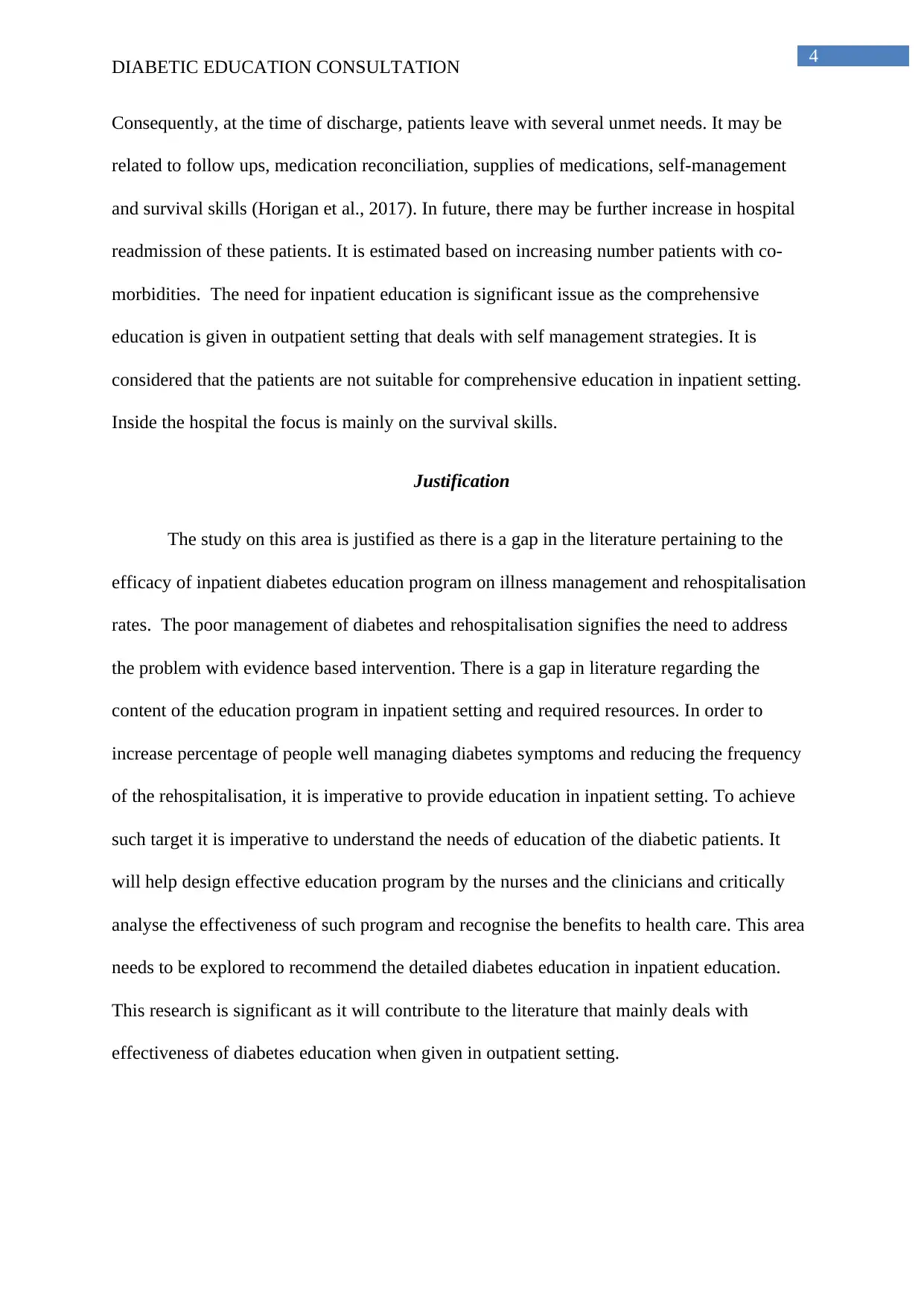
4
DIABETIC EDUCATION CONSULTATION
Consequently, at the time of discharge, patients leave with several unmet needs. It may be
related to follow ups, medication reconciliation, supplies of medications, self-management
and survival skills (Horigan et al., 2017). In future, there may be further increase in hospital
readmission of these patients. It is estimated based on increasing number patients with co-
morbidities. The need for inpatient education is significant issue as the comprehensive
education is given in outpatient setting that deals with self management strategies. It is
considered that the patients are not suitable for comprehensive education in inpatient setting.
Inside the hospital the focus is mainly on the survival skills.
Justification
The study on this area is justified as there is a gap in the literature pertaining to the
efficacy of inpatient diabetes education program on illness management and rehospitalisation
rates. The poor management of diabetes and rehospitalisation signifies the need to address
the problem with evidence based intervention. There is a gap in literature regarding the
content of the education program in inpatient setting and required resources. In order to
increase percentage of people well managing diabetes symptoms and reducing the frequency
of the rehospitalisation, it is imperative to provide education in inpatient setting. To achieve
such target it is imperative to understand the needs of education of the diabetic patients. It
will help design effective education program by the nurses and the clinicians and critically
analyse the effectiveness of such program and recognise the benefits to health care. This area
needs to be explored to recommend the detailed diabetes education in inpatient education.
This research is significant as it will contribute to the literature that mainly deals with
effectiveness of diabetes education when given in outpatient setting.
DIABETIC EDUCATION CONSULTATION
Consequently, at the time of discharge, patients leave with several unmet needs. It may be
related to follow ups, medication reconciliation, supplies of medications, self-management
and survival skills (Horigan et al., 2017). In future, there may be further increase in hospital
readmission of these patients. It is estimated based on increasing number patients with co-
morbidities. The need for inpatient education is significant issue as the comprehensive
education is given in outpatient setting that deals with self management strategies. It is
considered that the patients are not suitable for comprehensive education in inpatient setting.
Inside the hospital the focus is mainly on the survival skills.
Justification
The study on this area is justified as there is a gap in the literature pertaining to the
efficacy of inpatient diabetes education program on illness management and rehospitalisation
rates. The poor management of diabetes and rehospitalisation signifies the need to address
the problem with evidence based intervention. There is a gap in literature regarding the
content of the education program in inpatient setting and required resources. In order to
increase percentage of people well managing diabetes symptoms and reducing the frequency
of the rehospitalisation, it is imperative to provide education in inpatient setting. To achieve
such target it is imperative to understand the needs of education of the diabetic patients. It
will help design effective education program by the nurses and the clinicians and critically
analyse the effectiveness of such program and recognise the benefits to health care. This area
needs to be explored to recommend the detailed diabetes education in inpatient education.
This research is significant as it will contribute to the literature that mainly deals with
effectiveness of diabetes education when given in outpatient setting.
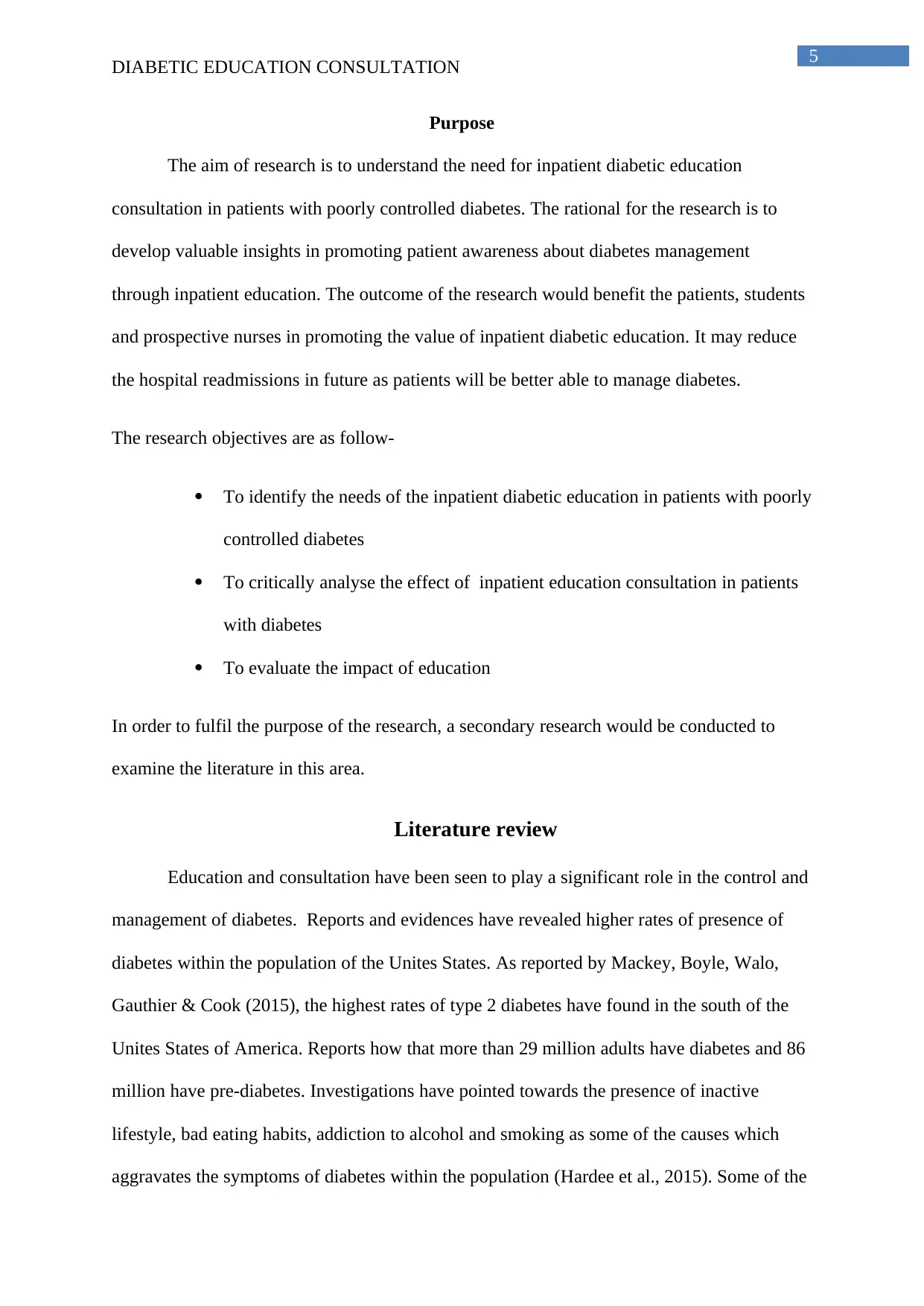
5
DIABETIC EDUCATION CONSULTATION
Purpose
The aim of research is to understand the need for inpatient diabetic education
consultation in patients with poorly controlled diabetes. The rational for the research is to
develop valuable insights in promoting patient awareness about diabetes management
through inpatient education. The outcome of the research would benefit the patients, students
and prospective nurses in promoting the value of inpatient diabetic education. It may reduce
the hospital readmissions in future as patients will be better able to manage diabetes.
The research objectives are as follow-
To identify the needs of the inpatient diabetic education in patients with poorly
controlled diabetes
To critically analyse the effect of inpatient education consultation in patients
with diabetes
To evaluate the impact of education
In order to fulfil the purpose of the research, a secondary research would be conducted to
examine the literature in this area.
Literature review
Education and consultation have been seen to play a significant role in the control and
management of diabetes. Reports and evidences have revealed higher rates of presence of
diabetes within the population of the Unites States. As reported by Mackey, Boyle, Walo,
Gauthier & Cook (2015), the highest rates of type 2 diabetes have found in the south of the
Unites States of America. Reports how that more than 29 million adults have diabetes and 86
million have pre-diabetes. Investigations have pointed towards the presence of inactive
lifestyle, bad eating habits, addiction to alcohol and smoking as some of the causes which
aggravates the symptoms of diabetes within the population (Hardee et al., 2015). Some of the
DIABETIC EDUCATION CONSULTATION
Purpose
The aim of research is to understand the need for inpatient diabetic education
consultation in patients with poorly controlled diabetes. The rational for the research is to
develop valuable insights in promoting patient awareness about diabetes management
through inpatient education. The outcome of the research would benefit the patients, students
and prospective nurses in promoting the value of inpatient diabetic education. It may reduce
the hospital readmissions in future as patients will be better able to manage diabetes.
The research objectives are as follow-
To identify the needs of the inpatient diabetic education in patients with poorly
controlled diabetes
To critically analyse the effect of inpatient education consultation in patients
with diabetes
To evaluate the impact of education
In order to fulfil the purpose of the research, a secondary research would be conducted to
examine the literature in this area.
Literature review
Education and consultation have been seen to play a significant role in the control and
management of diabetes. Reports and evidences have revealed higher rates of presence of
diabetes within the population of the Unites States. As reported by Mackey, Boyle, Walo,
Gauthier & Cook (2015), the highest rates of type 2 diabetes have found in the south of the
Unites States of America. Reports how that more than 29 million adults have diabetes and 86
million have pre-diabetes. Investigations have pointed towards the presence of inactive
lifestyle, bad eating habits, addiction to alcohol and smoking as some of the causes which
aggravates the symptoms of diabetes within the population (Hardee et al., 2015). Some of the
⊘ This is a preview!⊘
Do you want full access?
Subscribe today to unlock all pages.

Trusted by 1+ million students worldwide
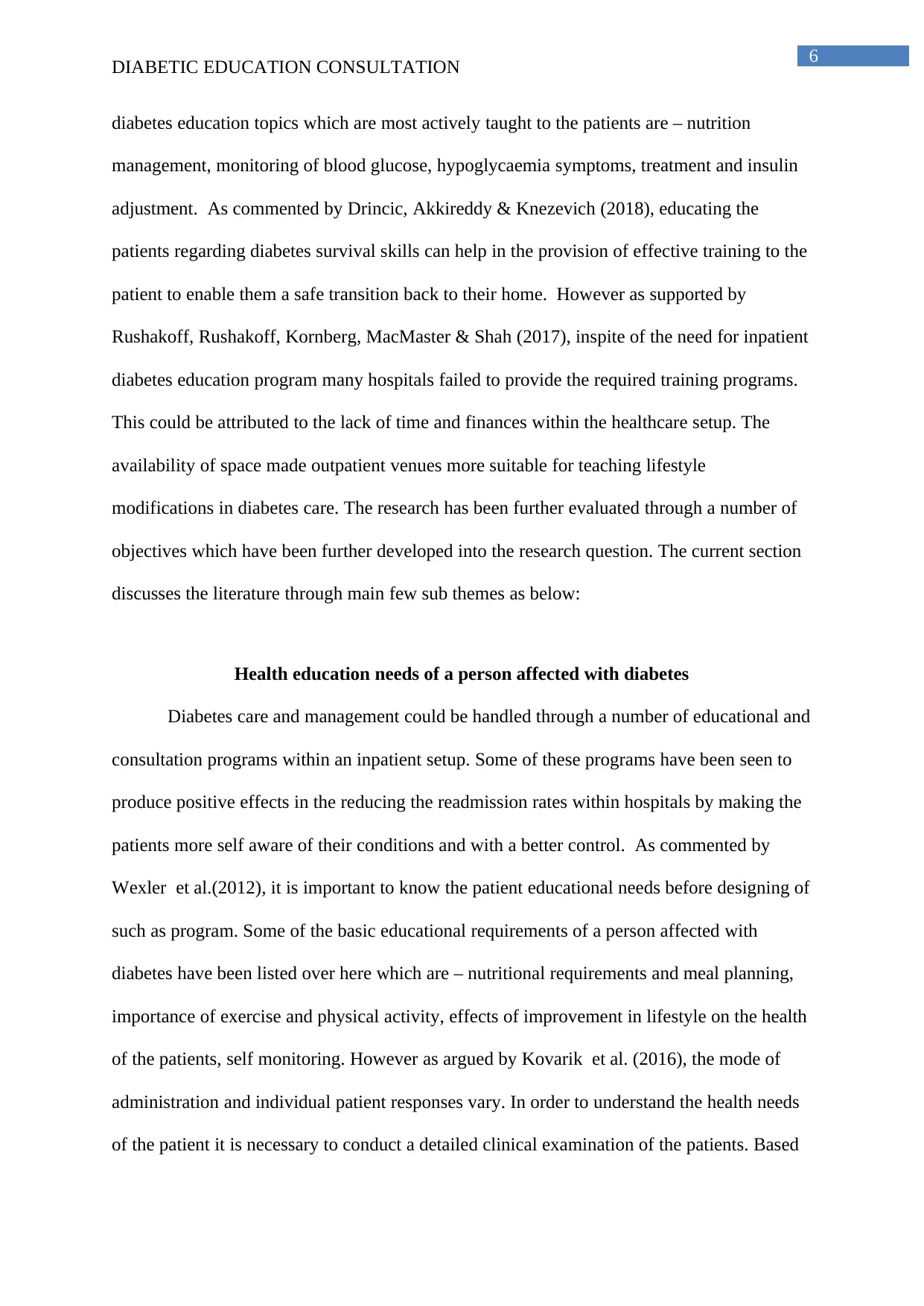
6
DIABETIC EDUCATION CONSULTATION
diabetes education topics which are most actively taught to the patients are – nutrition
management, monitoring of blood glucose, hypoglycaemia symptoms, treatment and insulin
adjustment. As commented by Drincic, Akkireddy & Knezevich (2018), educating the
patients regarding diabetes survival skills can help in the provision of effective training to the
patient to enable them a safe transition back to their home. However as supported by
Rushakoff, Rushakoff, Kornberg, MacMaster & Shah (2017), inspite of the need for inpatient
diabetes education program many hospitals failed to provide the required training programs.
This could be attributed to the lack of time and finances within the healthcare setup. The
availability of space made outpatient venues more suitable for teaching lifestyle
modifications in diabetes care. The research has been further evaluated through a number of
objectives which have been further developed into the research question. The current section
discusses the literature through main few sub themes as below:
Health education needs of a person affected with diabetes
Diabetes care and management could be handled through a number of educational and
consultation programs within an inpatient setup. Some of these programs have been seen to
produce positive effects in the reducing the readmission rates within hospitals by making the
patients more self aware of their conditions and with a better control. As commented by
Wexler et al.(2012), it is important to know the patient educational needs before designing of
such as program. Some of the basic educational requirements of a person affected with
diabetes have been listed over here which are – nutritional requirements and meal planning,
importance of exercise and physical activity, effects of improvement in lifestyle on the health
of the patients, self monitoring. However as argued by Kovarik et al. (2016), the mode of
administration and individual patient responses vary. In order to understand the health needs
of the patient it is necessary to conduct a detailed clinical examination of the patients. Based
DIABETIC EDUCATION CONSULTATION
diabetes education topics which are most actively taught to the patients are – nutrition
management, monitoring of blood glucose, hypoglycaemia symptoms, treatment and insulin
adjustment. As commented by Drincic, Akkireddy & Knezevich (2018), educating the
patients regarding diabetes survival skills can help in the provision of effective training to the
patient to enable them a safe transition back to their home. However as supported by
Rushakoff, Rushakoff, Kornberg, MacMaster & Shah (2017), inspite of the need for inpatient
diabetes education program many hospitals failed to provide the required training programs.
This could be attributed to the lack of time and finances within the healthcare setup. The
availability of space made outpatient venues more suitable for teaching lifestyle
modifications in diabetes care. The research has been further evaluated through a number of
objectives which have been further developed into the research question. The current section
discusses the literature through main few sub themes as below:
Health education needs of a person affected with diabetes
Diabetes care and management could be handled through a number of educational and
consultation programs within an inpatient setup. Some of these programs have been seen to
produce positive effects in the reducing the readmission rates within hospitals by making the
patients more self aware of their conditions and with a better control. As commented by
Wexler et al.(2012), it is important to know the patient educational needs before designing of
such as program. Some of the basic educational requirements of a person affected with
diabetes have been listed over here which are – nutritional requirements and meal planning,
importance of exercise and physical activity, effects of improvement in lifestyle on the health
of the patients, self monitoring. However as argued by Kovarik et al. (2016), the mode of
administration and individual patient responses vary. In order to understand the health needs
of the patient it is necessary to conduct a detailed clinical examination of the patients. Based
Paraphrase This Document
Need a fresh take? Get an instant paraphrase of this document with our AI Paraphraser
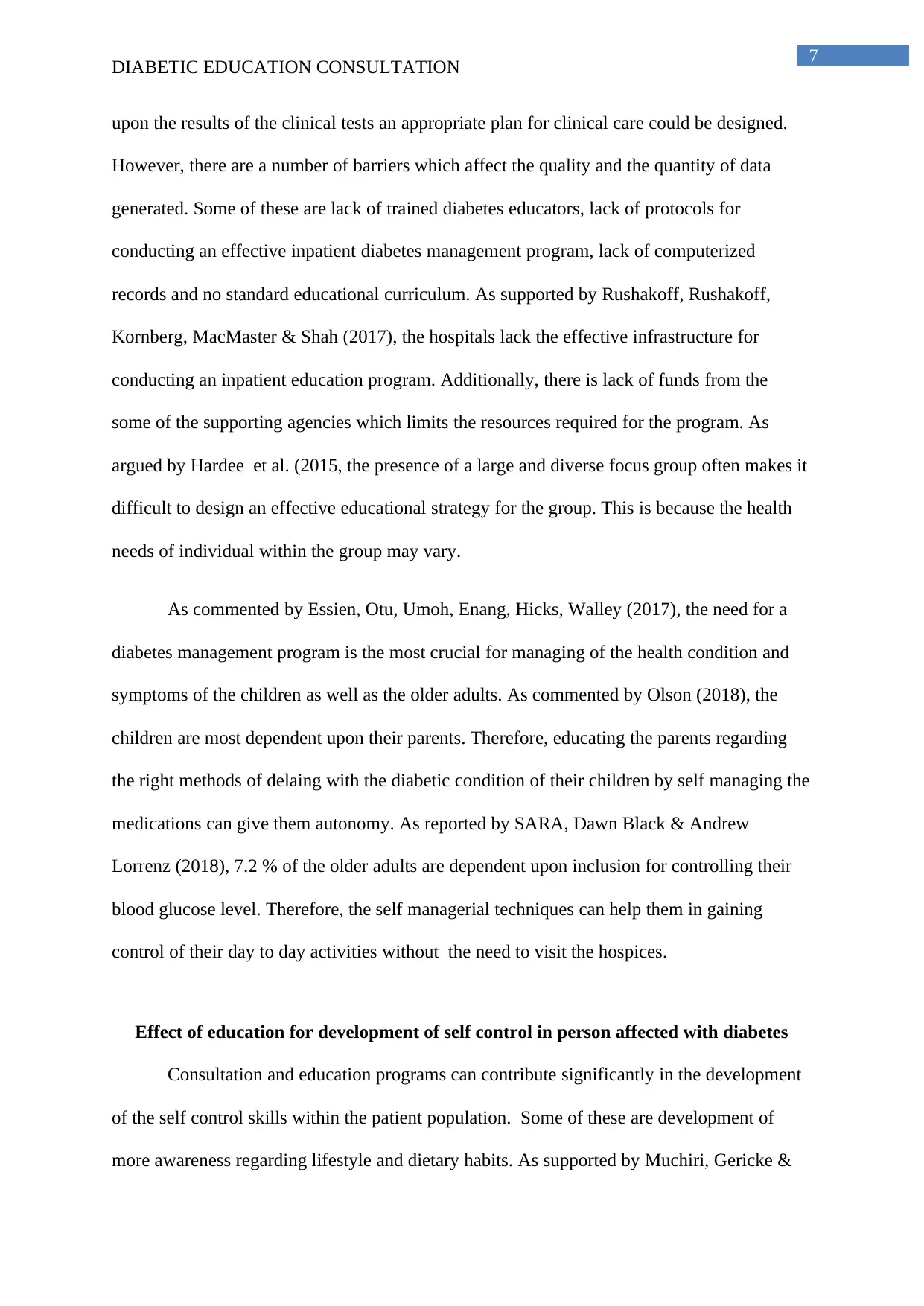
7
DIABETIC EDUCATION CONSULTATION
upon the results of the clinical tests an appropriate plan for clinical care could be designed.
However, there are a number of barriers which affect the quality and the quantity of data
generated. Some of these are lack of trained diabetes educators, lack of protocols for
conducting an effective inpatient diabetes management program, lack of computerized
records and no standard educational curriculum. As supported by Rushakoff, Rushakoff,
Kornberg, MacMaster & Shah (2017), the hospitals lack the effective infrastructure for
conducting an inpatient education program. Additionally, there is lack of funds from the
some of the supporting agencies which limits the resources required for the program. As
argued by Hardee et al. (2015, the presence of a large and diverse focus group often makes it
difficult to design an effective educational strategy for the group. This is because the health
needs of individual within the group may vary.
As commented by Essien, Otu, Umoh, Enang, Hicks, Walley (2017), the need for a
diabetes management program is the most crucial for managing of the health condition and
symptoms of the children as well as the older adults. As commented by Olson (2018), the
children are most dependent upon their parents. Therefore, educating the parents regarding
the right methods of delaing with the diabetic condition of their children by self managing the
medications can give them autonomy. As reported by SARA, Dawn Black & Andrew
Lorrenz (2018), 7.2 % of the older adults are dependent upon inclusion for controlling their
blood glucose level. Therefore, the self managerial techniques can help them in gaining
control of their day to day activities without the need to visit the hospices.
Effect of education for development of self control in person affected with diabetes
Consultation and education programs can contribute significantly in the development
of the self control skills within the patient population. Some of these are development of
more awareness regarding lifestyle and dietary habits. As supported by Muchiri, Gericke &
DIABETIC EDUCATION CONSULTATION
upon the results of the clinical tests an appropriate plan for clinical care could be designed.
However, there are a number of barriers which affect the quality and the quantity of data
generated. Some of these are lack of trained diabetes educators, lack of protocols for
conducting an effective inpatient diabetes management program, lack of computerized
records and no standard educational curriculum. As supported by Rushakoff, Rushakoff,
Kornberg, MacMaster & Shah (2017), the hospitals lack the effective infrastructure for
conducting an inpatient education program. Additionally, there is lack of funds from the
some of the supporting agencies which limits the resources required for the program. As
argued by Hardee et al. (2015, the presence of a large and diverse focus group often makes it
difficult to design an effective educational strategy for the group. This is because the health
needs of individual within the group may vary.
As commented by Essien, Otu, Umoh, Enang, Hicks, Walley (2017), the need for a
diabetes management program is the most crucial for managing of the health condition and
symptoms of the children as well as the older adults. As commented by Olson (2018), the
children are most dependent upon their parents. Therefore, educating the parents regarding
the right methods of delaing with the diabetic condition of their children by self managing the
medications can give them autonomy. As reported by SARA, Dawn Black & Andrew
Lorrenz (2018), 7.2 % of the older adults are dependent upon inclusion for controlling their
blood glucose level. Therefore, the self managerial techniques can help them in gaining
control of their day to day activities without the need to visit the hospices.
Effect of education for development of self control in person affected with diabetes
Consultation and education programs can contribute significantly in the development
of the self control skills within the patient population. Some of these are development of
more awareness regarding lifestyle and dietary habits. As supported by Muchiri, Gericke &
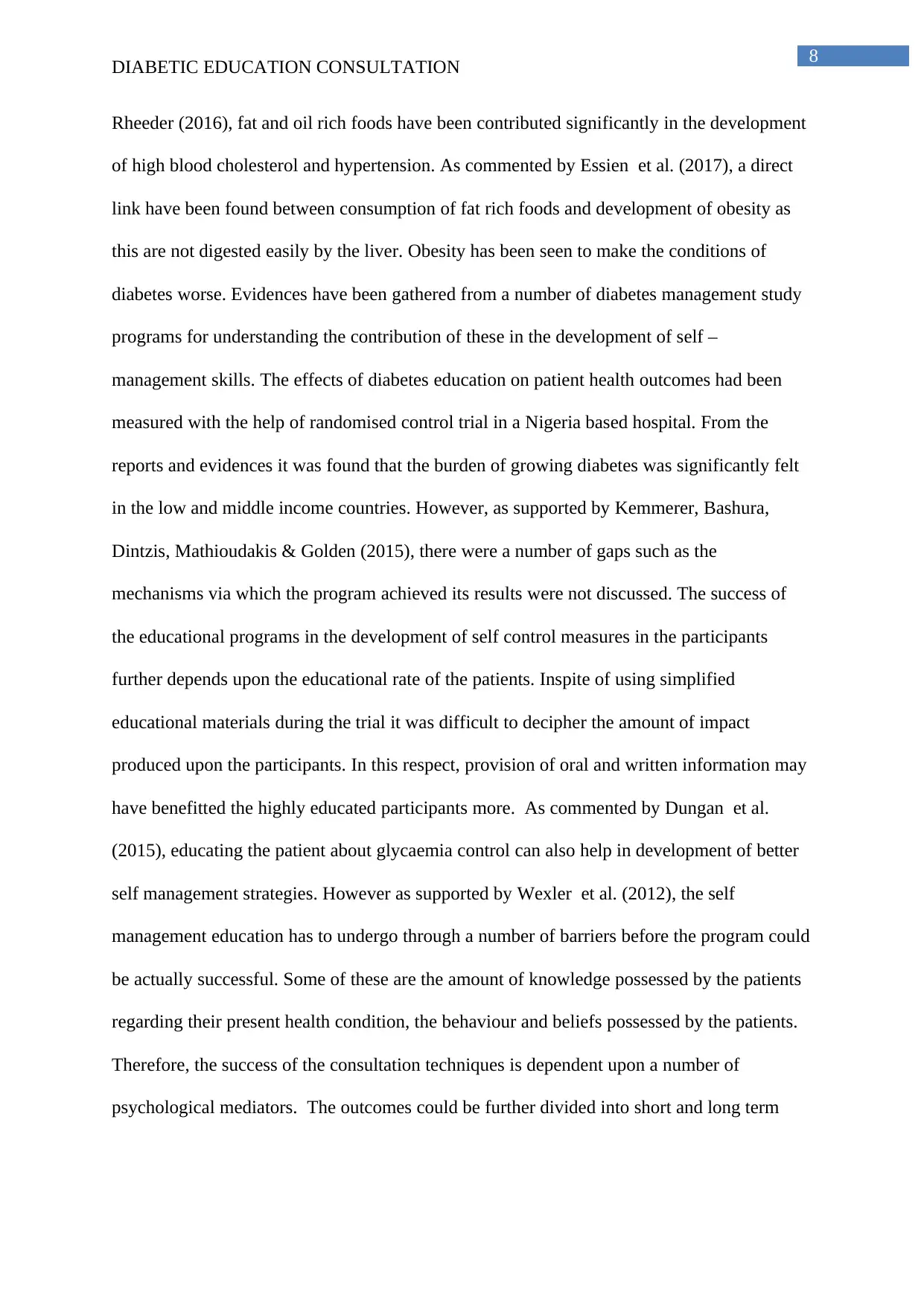
8
DIABETIC EDUCATION CONSULTATION
Rheeder (2016), fat and oil rich foods have been contributed significantly in the development
of high blood cholesterol and hypertension. As commented by Essien et al. (2017), a direct
link have been found between consumption of fat rich foods and development of obesity as
this are not digested easily by the liver. Obesity has been seen to make the conditions of
diabetes worse. Evidences have been gathered from a number of diabetes management study
programs for understanding the contribution of these in the development of self –
management skills. The effects of diabetes education on patient health outcomes had been
measured with the help of randomised control trial in a Nigeria based hospital. From the
reports and evidences it was found that the burden of growing diabetes was significantly felt
in the low and middle income countries. However, as supported by Kemmerer, Bashura,
Dintzis, Mathioudakis & Golden (2015), there were a number of gaps such as the
mechanisms via which the program achieved its results were not discussed. The success of
the educational programs in the development of self control measures in the participants
further depends upon the educational rate of the patients. Inspite of using simplified
educational materials during the trial it was difficult to decipher the amount of impact
produced upon the participants. In this respect, provision of oral and written information may
have benefitted the highly educated participants more. As commented by Dungan et al.
(2015), educating the patient about glycaemia control can also help in development of better
self management strategies. However as supported by Wexler et al. (2012), the self
management education has to undergo through a number of barriers before the program could
be actually successful. Some of these are the amount of knowledge possessed by the patients
regarding their present health condition, the behaviour and beliefs possessed by the patients.
Therefore, the success of the consultation techniques is dependent upon a number of
psychological mediators. The outcomes could be further divided into short and long term
DIABETIC EDUCATION CONSULTATION
Rheeder (2016), fat and oil rich foods have been contributed significantly in the development
of high blood cholesterol and hypertension. As commented by Essien et al. (2017), a direct
link have been found between consumption of fat rich foods and development of obesity as
this are not digested easily by the liver. Obesity has been seen to make the conditions of
diabetes worse. Evidences have been gathered from a number of diabetes management study
programs for understanding the contribution of these in the development of self –
management skills. The effects of diabetes education on patient health outcomes had been
measured with the help of randomised control trial in a Nigeria based hospital. From the
reports and evidences it was found that the burden of growing diabetes was significantly felt
in the low and middle income countries. However, as supported by Kemmerer, Bashura,
Dintzis, Mathioudakis & Golden (2015), there were a number of gaps such as the
mechanisms via which the program achieved its results were not discussed. The success of
the educational programs in the development of self control measures in the participants
further depends upon the educational rate of the patients. Inspite of using simplified
educational materials during the trial it was difficult to decipher the amount of impact
produced upon the participants. In this respect, provision of oral and written information may
have benefitted the highly educated participants more. As commented by Dungan et al.
(2015), educating the patient about glycaemia control can also help in development of better
self management strategies. However as supported by Wexler et al. (2012), the self
management education has to undergo through a number of barriers before the program could
be actually successful. Some of these are the amount of knowledge possessed by the patients
regarding their present health condition, the behaviour and beliefs possessed by the patients.
Therefore, the success of the consultation techniques is dependent upon a number of
psychological mediators. The outcomes could be further divided into short and long term
⊘ This is a preview!⊘
Do you want full access?
Subscribe today to unlock all pages.

Trusted by 1+ million students worldwide
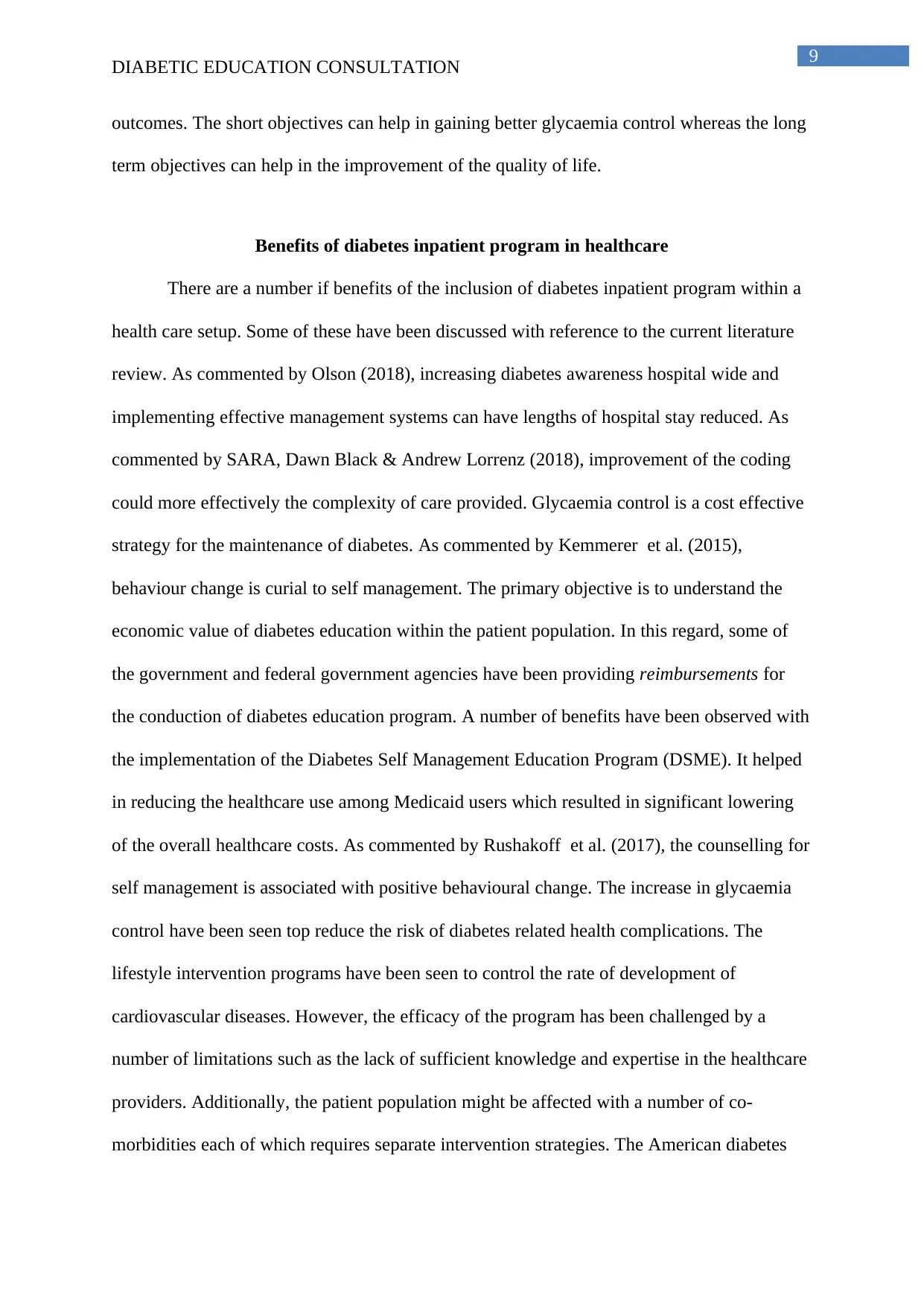
9
DIABETIC EDUCATION CONSULTATION
outcomes. The short objectives can help in gaining better glycaemia control whereas the long
term objectives can help in the improvement of the quality of life.
Benefits of diabetes inpatient program in healthcare
There are a number if benefits of the inclusion of diabetes inpatient program within a
health care setup. Some of these have been discussed with reference to the current literature
review. As commented by Olson (2018), increasing diabetes awareness hospital wide and
implementing effective management systems can have lengths of hospital stay reduced. As
commented by SARA, Dawn Black & Andrew Lorrenz (2018), improvement of the coding
could more effectively the complexity of care provided. Glycaemia control is a cost effective
strategy for the maintenance of diabetes. As commented by Kemmerer et al. (2015),
behaviour change is curial to self management. The primary objective is to understand the
economic value of diabetes education within the patient population. In this regard, some of
the government and federal government agencies have been providing reimbursements for
the conduction of diabetes education program. A number of benefits have been observed with
the implementation of the Diabetes Self Management Education Program (DSME). It helped
in reducing the healthcare use among Medicaid users which resulted in significant lowering
of the overall healthcare costs. As commented by Rushakoff et al. (2017), the counselling for
self management is associated with positive behavioural change. The increase in glycaemia
control have been seen top reduce the risk of diabetes related health complications. The
lifestyle intervention programs have been seen to control the rate of development of
cardiovascular diseases. However, the efficacy of the program has been challenged by a
number of limitations such as the lack of sufficient knowledge and expertise in the healthcare
providers. Additionally, the patient population might be affected with a number of co-
morbidities each of which requires separate intervention strategies. The American diabetes
DIABETIC EDUCATION CONSULTATION
outcomes. The short objectives can help in gaining better glycaemia control whereas the long
term objectives can help in the improvement of the quality of life.
Benefits of diabetes inpatient program in healthcare
There are a number if benefits of the inclusion of diabetes inpatient program within a
health care setup. Some of these have been discussed with reference to the current literature
review. As commented by Olson (2018), increasing diabetes awareness hospital wide and
implementing effective management systems can have lengths of hospital stay reduced. As
commented by SARA, Dawn Black & Andrew Lorrenz (2018), improvement of the coding
could more effectively the complexity of care provided. Glycaemia control is a cost effective
strategy for the maintenance of diabetes. As commented by Kemmerer et al. (2015),
behaviour change is curial to self management. The primary objective is to understand the
economic value of diabetes education within the patient population. In this regard, some of
the government and federal government agencies have been providing reimbursements for
the conduction of diabetes education program. A number of benefits have been observed with
the implementation of the Diabetes Self Management Education Program (DSME). It helped
in reducing the healthcare use among Medicaid users which resulted in significant lowering
of the overall healthcare costs. As commented by Rushakoff et al. (2017), the counselling for
self management is associated with positive behavioural change. The increase in glycaemia
control have been seen top reduce the risk of diabetes related health complications. The
lifestyle intervention programs have been seen to control the rate of development of
cardiovascular diseases. However, the efficacy of the program has been challenged by a
number of limitations such as the lack of sufficient knowledge and expertise in the healthcare
providers. Additionally, the patient population might be affected with a number of co-
morbidities each of which requires separate intervention strategies. The American diabetes
Paraphrase This Document
Need a fresh take? Get an instant paraphrase of this document with our AI Paraphraser
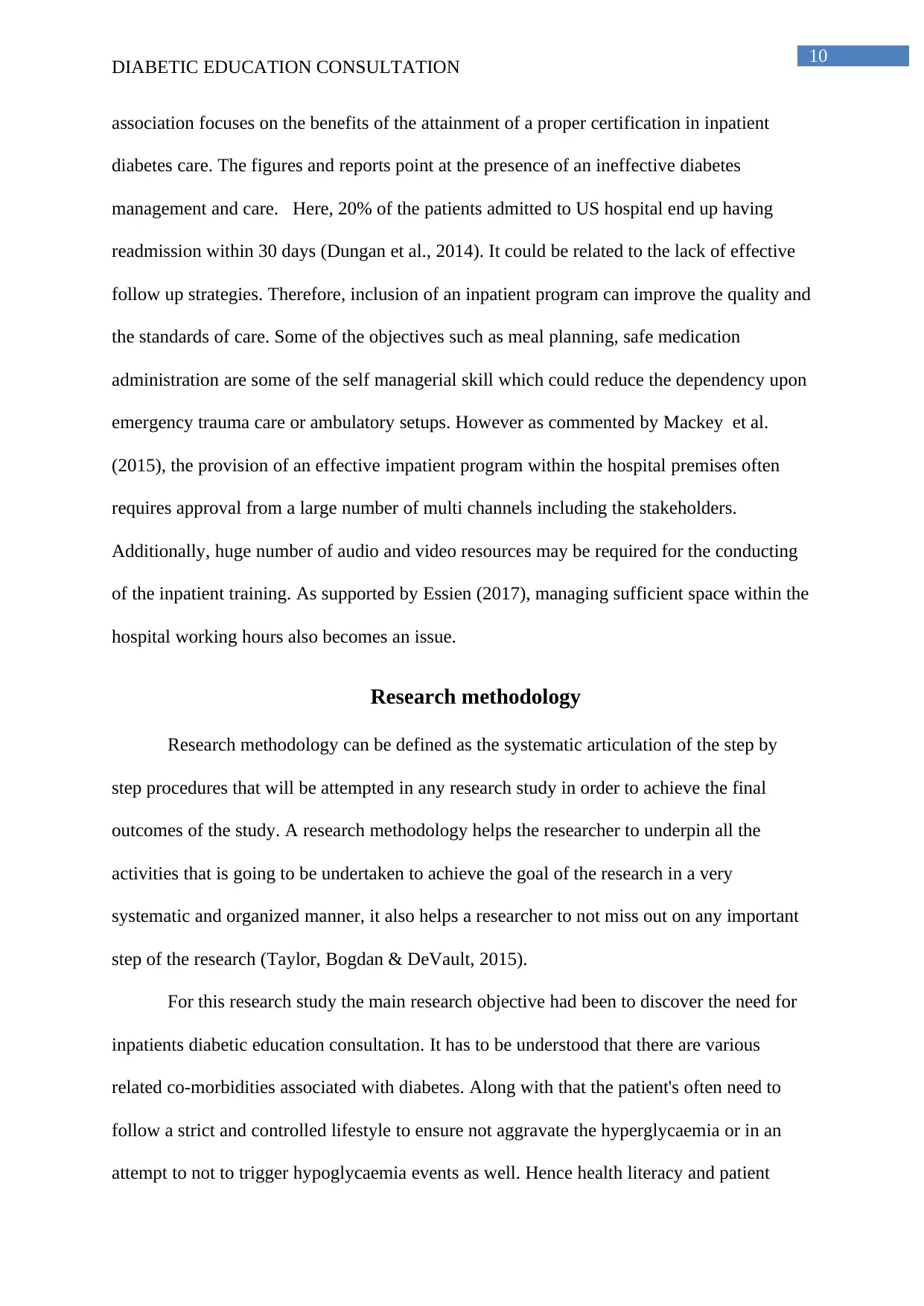
10
DIABETIC EDUCATION CONSULTATION
association focuses on the benefits of the attainment of a proper certification in inpatient
diabetes care. The figures and reports point at the presence of an ineffective diabetes
management and care. Here, 20% of the patients admitted to US hospital end up having
readmission within 30 days (Dungan et al., 2014). It could be related to the lack of effective
follow up strategies. Therefore, inclusion of an inpatient program can improve the quality and
the standards of care. Some of the objectives such as meal planning, safe medication
administration are some of the self managerial skill which could reduce the dependency upon
emergency trauma care or ambulatory setups. However as commented by Mackey et al.
(2015), the provision of an effective impatient program within the hospital premises often
requires approval from a large number of multi channels including the stakeholders.
Additionally, huge number of audio and video resources may be required for the conducting
of the inpatient training. As supported by Essien (2017), managing sufficient space within the
hospital working hours also becomes an issue.
Research methodology
Research methodology can be defined as the systematic articulation of the step by
step procedures that will be attempted in any research study in order to achieve the final
outcomes of the study. A research methodology helps the researcher to underpin all the
activities that is going to be undertaken to achieve the goal of the research in a very
systematic and organized manner, it also helps a researcher to not miss out on any important
step of the research (Taylor, Bogdan & DeVault, 2015).
For this research study the main research objective had been to discover the need for
inpatients diabetic education consultation. It has to be understood that there are various
related co-morbidities associated with diabetes. Along with that the patient's often need to
follow a strict and controlled lifestyle to ensure not aggravate the hyperglycaemia or in an
attempt to not to trigger hypoglycaemia events as well. Hence health literacy and patient
DIABETIC EDUCATION CONSULTATION
association focuses on the benefits of the attainment of a proper certification in inpatient
diabetes care. The figures and reports point at the presence of an ineffective diabetes
management and care. Here, 20% of the patients admitted to US hospital end up having
readmission within 30 days (Dungan et al., 2014). It could be related to the lack of effective
follow up strategies. Therefore, inclusion of an inpatient program can improve the quality and
the standards of care. Some of the objectives such as meal planning, safe medication
administration are some of the self managerial skill which could reduce the dependency upon
emergency trauma care or ambulatory setups. However as commented by Mackey et al.
(2015), the provision of an effective impatient program within the hospital premises often
requires approval from a large number of multi channels including the stakeholders.
Additionally, huge number of audio and video resources may be required for the conducting
of the inpatient training. As supported by Essien (2017), managing sufficient space within the
hospital working hours also becomes an issue.
Research methodology
Research methodology can be defined as the systematic articulation of the step by
step procedures that will be attempted in any research study in order to achieve the final
outcomes of the study. A research methodology helps the researcher to underpin all the
activities that is going to be undertaken to achieve the goal of the research in a very
systematic and organized manner, it also helps a researcher to not miss out on any important
step of the research (Taylor, Bogdan & DeVault, 2015).
For this research study the main research objective had been to discover the need for
inpatients diabetic education consultation. It has to be understood that there are various
related co-morbidities associated with diabetes. Along with that the patient's often need to
follow a strict and controlled lifestyle to ensure not aggravate the hyperglycaemia or in an
attempt to not to trigger hypoglycaemia events as well. Hence health literacy and patient
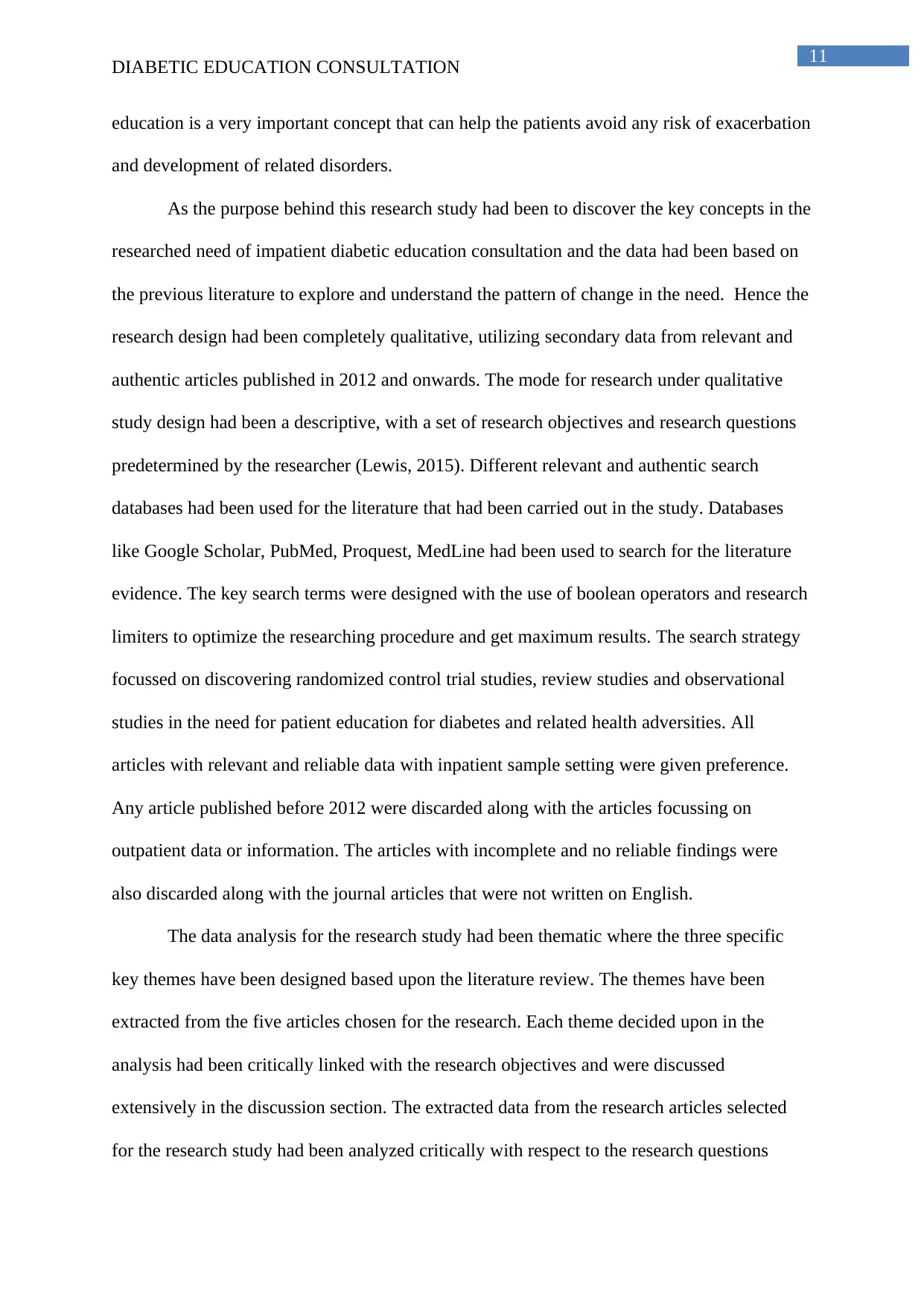
11
DIABETIC EDUCATION CONSULTATION
education is a very important concept that can help the patients avoid any risk of exacerbation
and development of related disorders.
As the purpose behind this research study had been to discover the key concepts in the
researched need of impatient diabetic education consultation and the data had been based on
the previous literature to explore and understand the pattern of change in the need. Hence the
research design had been completely qualitative, utilizing secondary data from relevant and
authentic articles published in 2012 and onwards. The mode for research under qualitative
study design had been a descriptive, with a set of research objectives and research questions
predetermined by the researcher (Lewis, 2015). Different relevant and authentic search
databases had been used for the literature that had been carried out in the study. Databases
like Google Scholar, PubMed, Proquest, MedLine had been used to search for the literature
evidence. The key search terms were designed with the use of boolean operators and research
limiters to optimize the researching procedure and get maximum results. The search strategy
focussed on discovering randomized control trial studies, review studies and observational
studies in the need for patient education for diabetes and related health adversities. All
articles with relevant and reliable data with inpatient sample setting were given preference.
Any article published before 2012 were discarded along with the articles focussing on
outpatient data or information. The articles with incomplete and no reliable findings were
also discarded along with the journal articles that were not written on English.
The data analysis for the research study had been thematic where the three specific
key themes have been designed based upon the literature review. The themes have been
extracted from the five articles chosen for the research. Each theme decided upon in the
analysis had been critically linked with the research objectives and were discussed
extensively in the discussion section. The extracted data from the research articles selected
for the research study had been analyzed critically with respect to the research questions
DIABETIC EDUCATION CONSULTATION
education is a very important concept that can help the patients avoid any risk of exacerbation
and development of related disorders.
As the purpose behind this research study had been to discover the key concepts in the
researched need of impatient diabetic education consultation and the data had been based on
the previous literature to explore and understand the pattern of change in the need. Hence the
research design had been completely qualitative, utilizing secondary data from relevant and
authentic articles published in 2012 and onwards. The mode for research under qualitative
study design had been a descriptive, with a set of research objectives and research questions
predetermined by the researcher (Lewis, 2015). Different relevant and authentic search
databases had been used for the literature that had been carried out in the study. Databases
like Google Scholar, PubMed, Proquest, MedLine had been used to search for the literature
evidence. The key search terms were designed with the use of boolean operators and research
limiters to optimize the researching procedure and get maximum results. The search strategy
focussed on discovering randomized control trial studies, review studies and observational
studies in the need for patient education for diabetes and related health adversities. All
articles with relevant and reliable data with inpatient sample setting were given preference.
Any article published before 2012 were discarded along with the articles focussing on
outpatient data or information. The articles with incomplete and no reliable findings were
also discarded along with the journal articles that were not written on English.
The data analysis for the research study had been thematic where the three specific
key themes have been designed based upon the literature review. The themes have been
extracted from the five articles chosen for the research. Each theme decided upon in the
analysis had been critically linked with the research objectives and were discussed
extensively in the discussion section. The extracted data from the research articles selected
for the research study had been analyzed critically with respect to the research questions
⊘ This is a preview!⊘
Do you want full access?
Subscribe today to unlock all pages.

Trusted by 1+ million students worldwide
1 out of 21
Related Documents
Your All-in-One AI-Powered Toolkit for Academic Success.
+13062052269
info@desklib.com
Available 24*7 on WhatsApp / Email
![[object Object]](/_next/static/media/star-bottom.7253800d.svg)
Unlock your academic potential
Copyright © 2020–2025 A2Z Services. All Rights Reserved. Developed and managed by ZUCOL.





